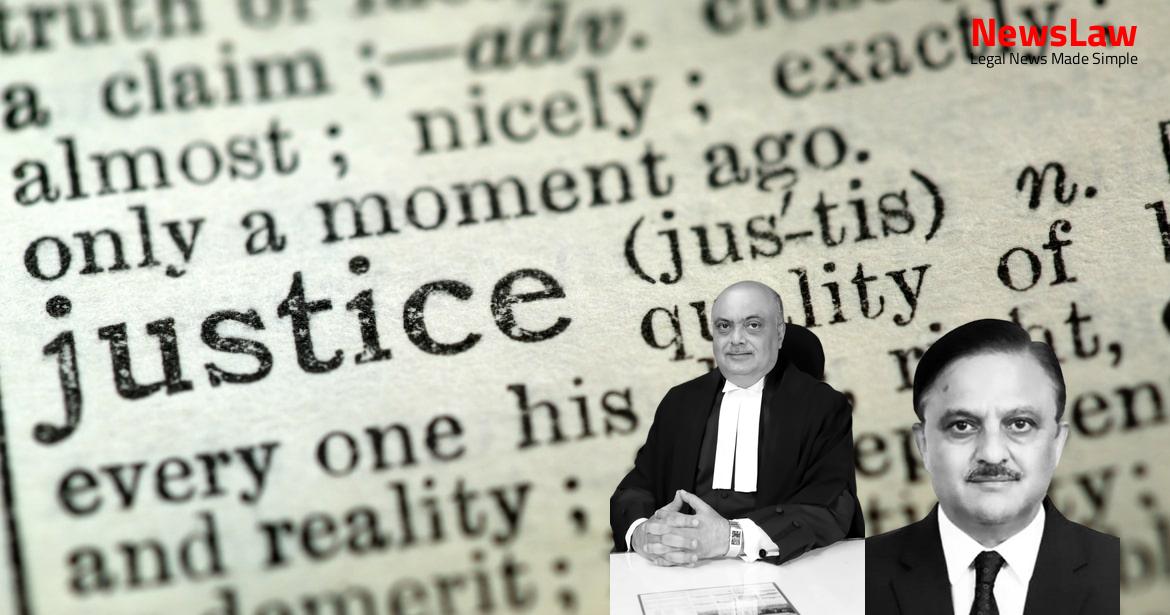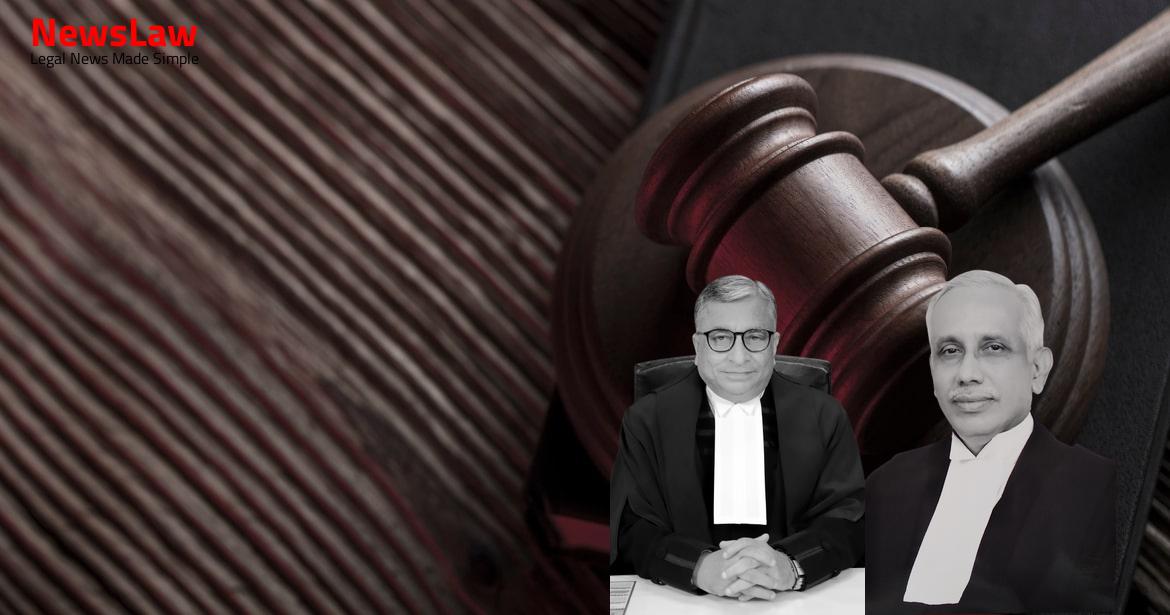In a recent ruling by the Supreme Court of India, the complaint and FIR in the case regarding Illegal Search and Seizure have been quashed. The case involved a dispute over the raid conducted by the Appropriate Authority, with the Civil Surgeon acting alone to authorize the search. Stay tuned to learn about the details of this significant legal decision.
Facts
- Dhanpati was contracted to perform the medical termination of pregnancy of the decoy patient.
- Initially, the ultrasound was quoted at Rs. 20,000 but later settled at Rs. 15,000.
- The complaint was filed under sub-Section (1) of Section 28 by an officer authorized by the Appropriate Authority.
- The allegation was of engaging in illegal sex determination of a foetus using ultrasound.
- The decoy patient was handed Rs. 15,000 for the procedure.
- A complaint and FIR were filed against Dhanpati and Anju for running a sex determination and termination racket.
- The decoy patient and police were caught when they came out of the diagnostic center.
- The High Court petition to quash the complaint and FIR was filed by Dhanpati.
- The raid on the Divine Diagnostic Centre in Gurugram revealed the illegal activities.
- The search party included police staff, shadow witness, and decoy patient who handed over Rs. 15,000 to Dhanpati.
- The raid also included the involvement of nurse Anju who received a part of the payment.
- The team raided the clinic where the decoy patient was scheduled for MTP, and Dhanpati was informed about the knowledge of the foetus’s sex.
- The appellant claimed to have been practicing as a General Physician and Radiologist for several years.
- A notification by the Government of Haryana regarding the Appropriate Authorities under the Act of 1994 was highlighted.
- Dhanpati called the decoy patient for MTP on 27 April 2017 at 8 am.
- High Court declined to quash the complaint
- High Court declined to quash the FIR
Also Read: Land Acquisition Case: Supreme Court Ruling in Lakshmesh M. v. P. Rajalakshmi & C.N. Rangaraju
Arguments
- Appellant’s counsel referred to the provisions of the 1994 Act.
- Civil Surgeon acted alone as the raiding team and authorized the search due to an emergency.
- Claimed that the FIR and complaint were based solely on the raid under Section 30(1).
- Affidavit by Dr. Virender Yadav, the Chairman of the District Appropriate Authority – cum-Civil Surgeon, Gurugram was highlighted.
- The State did not dispute that only the Civil Surgeon signed the raid order, making it illegal.
- Counsel for the State argued that the raid was unlawful as it was not conducted by the authorized officers of the Appropriate Authority.
- Two other members of the Appropriate Authority did not sign the raid authorization order.
- The search/raid conducted under the orders of the Appropriate Authority of the District was termed completely illegal as not all members of the authority had authorized it.
- The respondent’s counsel argues that any defect in the procedure followed during the appointment of officers for the raid does not amount to illegality.
- They claim that this defect is a curable irregularity.
- The subsequent order by the Appropriate Authority to file a complaint is seen as curing this irregularity.
Also Read: Child Custody Case: Ensuring Welfare and Best Interests
Analysis
- The Appropriate Authority comprises the Civil Surgeon, District Program Officer of the Women and Child Development Department, and the District Attorney in the district as per the 2013 notification.
- The Civil Surgeon, being the Chairman, holds a crucial position in the Appropriate Authority’s decision-making process.
- The decision to authorize a search must be made by the entire Appropriate Authority collectively and not by individual members.
- A physical meeting of the Appropriate Authority is not mandatory; decisions can be made via video meetings, ensuring all members are apprised of relevant materials.
- The decision to conduct the search in this case was solely made by the Civil Surgeon as an individual, thus rendering it illegal and against the stipulations of Section 30.
- Proper rationale and evidence are necessary for the Appropriate Authority to form a belief that an offense under the 1994 Act has been or is being committed.
- Documents and complaints must be shared promptly among all members of the Appropriate Authority for an informed decision-making process.
- The decision-making power under the 1994 Act lies with the entire Appropriate Authority, not just individual members acting alone.
- The test for action under the statute is whether a reasonable person, based on the available information, would be compelled to act as per the provisions of the law.
- Any person seeking sex selection or prenatal diagnostic techniques for unauthorized purposes is punishable.
- Search and seizure can only be authorized if the Appropriate Authority believes an offense under the 1994 Act has been or is being committed.
- The expression ‘reason to believe’ is defined in Section 26 of the Indian Penal Code.
- Offenses and penalties for contravening the provisions of the 1994 Act are outlined in Section 23.
- The State Government appoints Appropriate Authorities for enforcing the Act.
- Power to search and seize records is granted under Section 30(1) if an offense is believed to be committed.
- The Appropriate Authority must consist of specified members as per Section 17.
- Statute providing for ‘reason to believe’ needs reasons to be specified on the notice or available on materials provided
- Court’s interpretation of the expression ‘reason to believe’ depends on the context within the legislation
- Referring to the case of Aslam Mohammad Merchant v. Competent Authority & Ors., the Court interpreted the same expression
- In the case mentioned, the Court emphasized the importance of specifying or providing reasons for ‘reason to believe’
- Continuing prosecution based on an illegal search is an abuse of the process of law.
- The High Court should have recognized the illegality pointed out by the defense.
Also Read: Landmark Supreme Court Judgement in a Corporate Immunity Case
Decision
- The complaint bearing no. COMA No.40 of 2018 before the court of learned Chief Judicial Magistrate, Gurugram, is quashed.
- FIR No.408 dated 27th April 2017, registered in the Police Station, Gurugram at Gurugram, is quashed.
- The appeal is allowed, and the impugned judgment dated 13 January 2023 is set aside.
Case Title: RAVINDER KUMAR Vs. THE STATE OF HARYANA (2024 INSC 684)
Case Number: Crl.A. No.-003747-003747 – 2024



